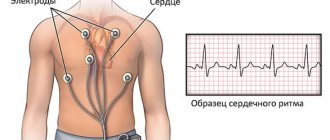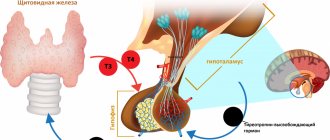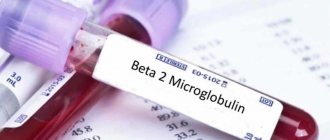Pyelonephritis
Colpitis
Thyrotoxicosis
Menopause
16684 October 15
IMPORTANT!
The information in this section cannot be used for self-diagnosis and self-treatment.
In case of pain or other exacerbation of the disease, diagnostic tests should be prescribed only by the attending physician. To make a diagnosis and properly prescribe treatment, you should contact your doctor. We remind you that independent interpretation of the results is unacceptable; the information below is for reference only.
Progesterone: indications for use, rules for preparing for the test, interpretation of results and normal indicators.
Detailed description of the study
Progesterone is a female steroid hormone produced by the corpus luteum of the ovaries and, during pregnancy, by the placenta. The concentration of progesterone in the blood is determined to confirm or exclude ovulation during the menstrual cycle. The maximum concentration of progesterone is observed in the luteal phase of the cycle.
Produced by the corpus luteum of the ovaries. A progesterone test is prescribed to identify the causes of infertility, determine the presence of ovulation, diagnose an ectopic or pathological pregnancy, and to monitor the condition of the fetus and placenta during pregnancy in the presence of complications. The main function of the hormone estradiol is to prepare a woman’s body for pregnancy. Each month, estrogen causes the inner lining of the uterus, the endometrium, to grow and renew itself, while luteinizing hormone (LH) causes one of the ovaries to release an egg. In place of the released egg, the so-called corpus luteum is formed, which produces progesterone. Progesterone, together with the hormone secreted by the adrenal glands, stops the growth of the endometrium and prepares the endometrium of the uterus for the implantation of a fertilized egg, and after its implantation helps to maintain pregnancy: it suppresses the activity of the smooth muscles of the uterus, maintains the dominance of pregnancy in the central nervous system; stimulates the development of the terminal secretory sections of the mammary glands and the growth of the uterus, the synthesis of steroid hormones; has an immunosuppressive effect, suppressing the reaction of rejection of the fertilized egg. Stimulates sebum secretion. If fertilization does not occur, the corpus luteum disappears, progesterone levels drop and menstrual bleeding occurs. If the fertilized egg attaches to the wall of the uterus, the corpus luteum continues to produce progesterone. After a few weeks, the placenta takes over the function of the corpus luteum to produce progesterone, being the main source of this hormone during pregnancy.
An increase in progesterone concentration occurs during pregnancy, tumors of the adrenal glands and testicles, hydatidiform mole, and ovarian chorionepithelioma. A decrease in hormone levels occurs when there is a threat of miscarriage, galactorrhea-amenorrhea syndrome, taking oral contraceptives and certain medications.
What is progesterone
Progesterone is a hormone of the female reproductive system, the synthesis of which occurs cyclically throughout the ovarian-menstrual cycle. The place of its synthesis is the woman’s ovaries, as well as the placenta during pregnancy.
The effects of this steroid substance in the female body are:
- Secretory transformations of the endometrium in the luteal phase. What does this mean? Due to estrogens, which are synthesized in the first phase of the cycle, active growth of the uterine mucosa occurs. Progesterone, on the contrary, has an antiproliferative effect. That is, it inhibits the growth of the endometrium, but ensures its secretory transformations (accumulation of glycogen in cells to ensure the trophic function of the embryo during pregnancy).
- Sedative effect.
- Relaxation of smooth muscle muscles (including the body of the uterus to maintain pregnancy). but progesterone, on the contrary, spasms the cervix, preventing the development of isthmic-cervical insufficiency during pregnancy.
- Transformations in the mammary glands to ensure lactation.
Causes of elevated progesterone levels:
- Presence of pregnancy;
- Hormonally active ovarian tumors;
- Chorionepithelioma;
- Bubble drift.
Reasons for decreased levels of the hormone progesterone in the blood:
- Luteal phase deficiency;
- Frozen (non-developing) pregnancy;
- Taking combined oral contraceptives.
When is it necessary to donate blood to check progesterone levels?
Since progesterone is a hormone, the level of which depends on the phase of the ovarian-menstrual cycle, therefore it is necessary to take it on certain days. If a woman is of reproductive age, and her cycle averages about 28 days, then the recommended interval for donating blood to check progesterone levels is days 21-23 of the ovarian-menstrual cycle.
The main functions of progesterone
- ensures the growth of glands in the uterine mucosa in the second half of the menstrual cycle;
- responsible for the regularity of menstruation;
- reduces the effects of estrogen;
- supports libido;
- its deficiency has a bad effect on a woman’s appearance;
- participates in the production of other steroids as an intermediate key link;
- thickens the mucus of the cervical canal, making it impermeable to sperm;
- promotes better embryo implantation by suppressing the immune system. Thanks to this, the embryo is not rejected by the mother’s body, and pregnancy occurs;
- inhibits lactation before the onset of labor, and a decrease in progesterone levels after the birth of a child is a signal for the production of prolactin;
- in the first trimester it suppresses spontaneous uterine contractions, relaxes the muscles of the uterus, protects the fertilized egg from rejection until the period of full formation of the feta-placental complex;
- probably, a decrease in progesterone concentration is the reason for the onset of labor;
- is a neurosteroid - affects the functioning of the brain;
- at the level of the central nervous system it helps to endure pregnancy and childbirth more easily.
Indications for the purpose of the study
Progesterone is a natural steroid hormone, synthesized in the ovaries, testicles, adrenal cortex, and during pregnancy - in the placenta.
It is a precursor to sex hormones and corticosteroids.
Women need progesterone so that they can successfully bear and give birth to a child. The hormone ensures the endometrium’s receptivity to the fertilized egg, its implantation and subsequent development. In the first trimester of pregnancy, progesterone increases the threshold of excitability of the muscle fibers of the uterus, which promotes pregnancy. In the second and third trimesters, high levels of progesterone inhibit the contractile activity of the uterus.
Progesterone ensures the ability of the maternal immune system to tolerate the effects of fetal antigens, which helps maintain pregnancy.
Progesterone receptors are found in the endometrium, myometrium, ovaries, mammary glands, as well as in the vascular endothelium, thymus, bones, bronchi, lungs, and pancreas. It has a relaxing effect on the smooth muscles of the uterus, blood vessels, and biliary system. Progesterone promotes the growth and development of glandular tissue of the mammary gland and blocks the secretion of milk by the mammary gland during pregnancy.
Progesterone affects brain structures (hypothalamus, pituitary gland, etc.) and affects the cognitive process, memory, emotions, sexual behavior, body temperature. Progesterone protects against bone loss.
Outside of pregnancy, progesterone promotes the transformation of the endometrium from a state of proliferation (tissue growth through cell multiplication by division) to a state of secretion (the process of releasing chemical compounds from the cell), promotes the rejection of the endometrium and the onset of menstruation.
Thus, a blood test for progesterone in women is prescribed:
- in case of irregularities in the menstrual cycle or absence of menstruation for a long time to identify the causes of the disorders;
- for pain in the mammary glands or regular pain in the lower abdomen;
- to identify the causes of infertility and miscarriage;
- with heavy bleeding from the vagina;
- to assess the condition of the placenta in the second half of pregnancy;
- to identify the causes of post-term pregnancy.
Progesterone in men is synthesized primarily in the testicles and is a precursor to such important hormones as neurosteroids, testosterone, cortisol, and aldosterone.
Progesterone prevents the proliferation of prostate tissue and the development of cancer. In addition, it controls blood sugar levels, affects nervous activity, normalizes the functioning of the thyroid gland, prevents an increase in estrogen levels, improves sleep, and keeps the skin in good condition.
Violation of progesterone levels in men can manifest as metabolic disorders, create preconditions for female-type obesity, causeless depression, drowsiness, sudden mood swings, headaches, fatigue, irritability, testicular atrophy, and decreased blood pressure. Changes in the level of progesterone in the blood also negatively affect sexual desire.
Thus, a doctor can give a man a referral for a blood test for progesterone:
- with signs of imbalance of hormones in the body (enlargement of the mammary glands of the female type (gynecomastia), loss of muscle mass, hair loss on the head and body, decreased libido, problems with ejaculation, erection, lack of calcium in the body, frequent mood changes, sharp fluctuations in body weight, the appearance of excess weight);
- if you suspect prostate cancer, tumors of the adrenal glands or testes;
- to monitor already prescribed therapy.
In children, a progesterone test is prescribed for abnormalities in the production of sex hormones.
Decoding indicators
If in the transcript of the analysis the progesterone indicator is indicated in ng/ml, then to obtain the most accurate indicator it is necessary to divide the figure by 3.18. The level of progesterone in the blood of boys and girls before puberty is the same and is less than 1.1 nmol/l. With the entry into adolescence, the beginning of hormonal changes and the active formation of sexual function, norms become different for children of both sexes. The production of progesterone outside of pregnancy largely depends on the stage of the menstrual cycle.
How to donate blood for hormones?
Murzaeva Irina Yurievna
Endocrinologist, Preventive Medicine Doctor
December 13, 2011
It has become good practice to check your hormonal levels even before any health problems begin. Below I will talk about the rules for taking tests; to make the search easier, we will “divide” the hormonal levels into systems.
- Hormones of the thyroid gland, parathyroid glands. These are TSH, free and total T4, free and total T3, antibodies to TPO, antibodies to TG, antibodies to rTSH, some others - calcitonin, parathyroid hormone. They must be taken on an empty stomach (that is, “empty stomach”), or 4-5 hours after eating. Tablets (such as L-thyroxine, Euthyrox, Tyrosol, Mercazolil, etc.) are taken after the test. If you have been ill or are suffering from ARVI, ARI, it is better to get tested 4-5 weeks after recovery. These tests have no connection with the menstrual cycle.
- Sex hormones (for women).
 These are LH, FSH, estradiol, progesterone, prolactin, testosterone (free and total), DHA-S, 17-OH-progesterone, androstenedione, dehydrotestosterone. It is advisable to take the test on an empty stomach, for prolactin - for 2 days, refrain from intense physical activity, drinking alcohol, or sex. Take it after the temperature drops, in the morning 1-2 hours after waking up (preferably no later). Taking medications, not only hormonal ones, is also taken into account (therefore, present a list of medications you are taking to the doctor, and do not describe their approximate appearance with words - “well, these are white, small, in a blue box, in general, I don’t remember what they are called”) FSH, LH , ESTRADIOL, TESTOSTERONE, DHA-S, 17-OH-PROGESTERONE, ANDROSTENDEDIONE, PROLACTIN - given on 2-5 days from the start of menstrual bleeding (this is the 1st phase of the cycle) with a 28-day cycle, with a cycle of more than 28 days - 5-7 days , including after bleeding caused by progesterone, on days 2-3 with a cycle of 23-21 days. PROGESTERONE, sometimes PROLACTIN is taken on days 21-22 of a 28-day cycle (phase 2), or calculated on days 6-8 after ovulation (if an ovulation test was performed). DEHYDROTESTOSTERONE is given on any day of the cycle. For men, the test conditions are the same (hormones are slightly different)
These are LH, FSH, estradiol, progesterone, prolactin, testosterone (free and total), DHA-S, 17-OH-progesterone, androstenedione, dehydrotestosterone. It is advisable to take the test on an empty stomach, for prolactin - for 2 days, refrain from intense physical activity, drinking alcohol, or sex. Take it after the temperature drops, in the morning 1-2 hours after waking up (preferably no later). Taking medications, not only hormonal ones, is also taken into account (therefore, present a list of medications you are taking to the doctor, and do not describe their approximate appearance with words - “well, these are white, small, in a blue box, in general, I don’t remember what they are called”) FSH, LH , ESTRADIOL, TESTOSTERONE, DHA-S, 17-OH-PROGESTERONE, ANDROSTENDEDIONE, PROLACTIN - given on 2-5 days from the start of menstrual bleeding (this is the 1st phase of the cycle) with a 28-day cycle, with a cycle of more than 28 days - 5-7 days , including after bleeding caused by progesterone, on days 2-3 with a cycle of 23-21 days. PROGESTERONE, sometimes PROLACTIN is taken on days 21-22 of a 28-day cycle (phase 2), or calculated on days 6-8 after ovulation (if an ovulation test was performed). DEHYDROTESTOSTERONE is given on any day of the cycle. For men, the test conditions are the same (hormones are slightly different) - Adrenal hormones. (These are cortisol, renin, aldosterone, metanephrine, normetanephrine, adrenaline, norepinephrine, etc.). Take on an empty stomach, preferably between 8-9 am (daily peak secretion - more related to cortisol!). Before donating renin, aldosterone, metanephrines, etc., take some groups of medications for 2 weeks: Veroshpiron, and ACE (enalapril), B-blockers (Egilok), Aspirin and some others.
- Hormones of the pituitary gland (the main endocrine gland). These are: ACTH, growth hormone (growth hormone). I have already told you about FSH, LH, prolactin. ACTH is given as cortisol, on an empty stomach, 8-9 am, sometimes at 13.00 (and/or 20.00) - as prescribed by the doctor. STG (ego analogue of IGF1) on an empty stomach, at any time.
- The hormone insulin is given on an empty stomach, usually along with blood sugar. Sometimes together with a test for “glucose tolerance” (then 2 times - on an empty stomach and 2 hours after the “sugar syrup”).
- 24-hour urine testing (17-KS and 17-OX) is not currently used; the reliability of these tests is very low. But daily urine testing for cortisol is often done! To do this, urine is collected 24 hours from 8.00 one day to 8.00 another day (the entire volume of collected urine is recorded), it is mixed and 150-200 ml is brought to the laboratory, along with a record of the allocated volume. Some laboratories ask you to bring all your urine, you need to clarify this issue in advance! The same applies to 24-hour urine a) for calcium and phosphorus, b) metanephrines c) vanillylmandelic acid (for these you need to take a special preservative from the laboratory! to collect urine). When collecting daily urine, the following are excluded from the diet: beets, carrots, bananas, turnips, citrus fruits, and calcium supplements.
In endocrinology, hormonal tests are also used, but they are a separate topic.
What happens when there is a lack of iron
A constant lack of microelement in the body leads to a decrease in hemoglobin levels and the development of iron deficiency anemia. The danger of this condition is that in the early stages, iron deficiency does not manifest itself clinically. If the child is generally healthy, then anemia may develop asymptomatically over a long period of time.
The first signs appear only when the level of hemoglobin in the blood drops to critical values. The child develops symptoms such as dizziness, general weakness, increased fatigue, headaches, pallor of the mucous membranes and skin.
RULE #3
The days of the menstrual cycle for studying hormone levels are strictly regulated. Results obtained only on certain days may be informative.
OPTIMAL TIME FOR HORMONAL STUDY.
There is a certain rule that allows you to make the most informative and indicative hormonal analysis, which allows you to characterize the entire menstrual cycle (ovulatory, anovulatory, insufficient luteal phase of the cycle).
1. With a normal menstrual cycle
| FIRST PHASE OF THE CYCLE | |
| HORMONE | Optimal time for analysis |
prolactin (Prl);
thyroid hormones, i.e. thyroid hormones in blood plasma:
| Days 2-5 of the menstrual cycle Allowable maximum: day 7 of the cycle |
| SECOND PHASE OF THE CYCLE | |
| progesterone | 20-22 days of the menstrual cycle (with a 28-day cycle) |
2. For menstrual irregularities or infertility
| FIRST PHASE OF THE CYCLE | |
| HORMONE | Optimal time for analysis |
| luteotropic hormone (LH); follicle-stimulating hormone (FSH); prolactin (Prl); testosterone (T); estradiol(T); dehydro-epiandrosterone sulfate (DHA-S); thyroid hormones, i.e. thyroid hormones in blood plasma:
|
|
| SECOND PHASE OF THE CYCLE | |
| progesterone | There is no need to donate progesterone (with the exception of cases of infertility). |
Taking tests
Analysis for progesterone is considered the most important, because fertilization and the development of pregnancy largely depend on this hormone. Blood for progesterone is taken on days 20–23 of menstruation.
Low levels of anti-Mullerian hormone (AMH) can cause infertility. AMH deficiency is usually observed in women after 30 years of age. Blood is donated for AMH on days 3–5 of the cycle.
The development of ovulation depends on prolactin. Elevated levels of the hormone prevent fertilization from being completed. Blood for prolactin analysis is donated on days 1–4 of menstruation.
The amount of estradiol varies depending on the phase of menstruation. Estradiol analysis is done on days 2–3 and 21–22 of the cycle.
Luteinizing hormone stimulates the appearance of the corpus luteum, this is another important factor affecting ovulation. During pregnancy, hormone levels should decrease. Blood is donated on days 3–8 and 19–21 of menstruation.
Dihydrotestosterone is considered a male hormone and affects the condition of the skin and hair. If dihydrotestosterone is elevated, acne will appear on the skin, and hair growth will also increase. In addition, high levels of DHT lead to infertility. Blood is donated on days 2–4 of menstruation.
Follicle-stimulating hormone provokes ovulation, and its deficiency leads to infertility. Blood is donated on days 2–5 or 20–21 of the cycle.
A reduced level of thyroxine during pregnancy is considered normal, but in other cases it causes a number of diseases. This test must be taken in the morning, since the amount of the hormone changes throughout the day.
Cortisol levels, like thyroxine, change during stress or fasting. During pregnancy it is elevated; in other cases, an increase in the hormone indicates a disease of the adrenal glands. Blood is donated on days 3–7 of menstruation.
Our clinics have the opportunity to donate blood for analysis of estradiol, progesterone, prolactin and other hormones that affect the course of pregnancy.
Indications for progesterone testing
Indications for prescribing a blood test for progesterone levels:
- presence of ovarian-menstrual cycle disorders in women;
- searching for the causes of infertility;
- the presence of dysfunctional uterine bleeding;
- identification of luteal phase insufficiency both in preparation for pregnancy and for the elimination or prevention of isthmic-cervical insufficiency during pregnancy (shortening of the cervix, which can lead to miscarriage/premature birth);
- miscarriage;
- infertility;
- embryogenesis disorder;
- lack of lactation;
- control over the course of pregnancy;
- spotting during pregnancy;
- metrorrhagia of unknown etiology;
- suspicion of disease of the genital and mammary glands, thyroid gland, adrenal glands;
- determination of ovulation;
- suspected ectopic pregnancy;
- complications during gestation;
- early treatment using progesterone in the regimen;
- control over the condition of the placenta and fetus;
- in the IVF program at the stimulation stage.
Research in women is also carried out if there is a suspicion of an appendage cyst, obesity, or metrorrhagia. In men - if the presence of abnormalities in the development of the testicles, adrenal dysfunction, or decreased potency is suspected.







